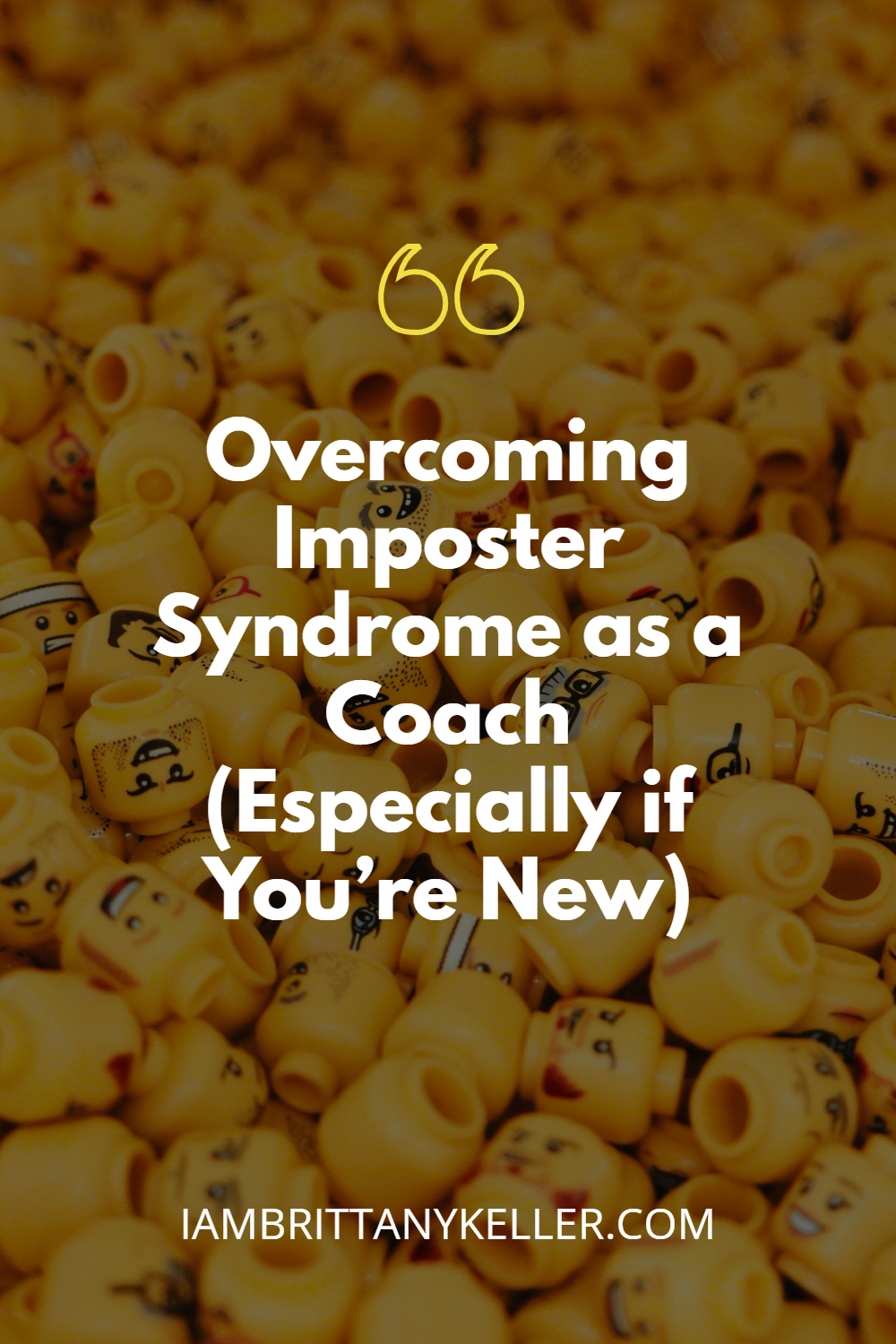Overcoming imposter syndrome as a coach is one hell of a challenge. That voice in your head screaming “Who the hell am I to do this?” can stop you cold before you even get started. It hits hard making you doubt your skills, question your worth, and freeze when it’s time to show up.
In fact, 82% of high-achievers report battling imposter syndrome at some point in their careers.
I know because I lived it. In my first year as a coach, I chased certificate after certificate, thinking if I just get one more, then I’ll finally be enough. I spent thousands of dollars and countless hours in trainings, yet I still hesitated to launch my offers.
The truth is, I already had years of leadership, mentoring, and transformation work under my belt. I had navigated trauma, built businesses, and helped people make massive shifts in their lives long before I started coaching professionally. But imposter syndrome made me forget all of that.
You don’t need more proof. You don’t need another course or title. You need to remember who the fuck you are and own your power.
That’s exactly what this post is about. Cutting through the noise, breaking down imposter syndrome, and helping you step fully into your coaching badassery.

What Does Overcoming Imposter Syndrome as a Coach Really Mean?
Overcoming imposter syndrome as a coach is the moment you stop questioning if you belong here and start owning the fact that you do.
It’s not about feeling ready. It’s about deciding you’re ready enough and moving anyway.
When you overcome it, you stop hiding. You stop playing small. You start saying yes to opportunities you used to talk yourself out of. You lead calls with confidence, make offers without the knot in your stomach, and show up in spaces that used to intimidate you.
Overcoming imposter syndrome as a coach is not about having every answer or becoming some polished, untouchable version of yourself. It is about trusting your skills, owning your value, and letting action build your confidence. That is where things start to shift fast.
Once you understand what it looks like on the other side, it becomes easier to spot what has been keeping you stuck in the first place. And that is where we need to go next.
The Root Cause of Imposter Syndrome as a Coach
At its core, imposter syndrome boils down to three things: self-doubt, perfectionism, and fear of being “found out.” You might feel like a fraud because you don’t have every answer or the “perfect” resume.
Most coaches believe they need more certifications or years of experience to prove their worth. One of my clients, Sarah, delayed launching for almost a year because she thought she needed another coaching credential. Once we worked together on nervous system regulation and rewiring her self-belief, she booked her first three paying clients in a week with no new certificate required.
The problem is old programming. Voices from your past, maybe a critical parent, a toxic boss, or unsupportive friends, drilled in the story that you’re not good enough. These messages run deep, but they aren’t truths. They’re lies you can rewrite.
What if the thing holding you back isn’t that you’re unqualified but that you’re scared of what success will demand from you? Most entrepreneurs never see this fear for what it is until it’s already sabotaging their results. Read this before it costs you your next big opportunity: Afraid of Success: Here’s Why You Keep Holding Yourself Back
The Impact of Imposter Syndrome as a Coach
Imposter syndrome isn’t just an annoying voice. It actively sabotages your business:
-
Confidence cratered. You second-guess every decision
-
Pricing panic. You lowball yourself or give away free sessions because you don’t believe you deserve it
-
Visibility vacuum. You hide behind the scenes, afraid to post or market your services
-
Client chaos. You struggle to build trust when you don’t believe in yourself
One coach I worked with refused to raise her prices even though her clients were getting incredible results. Once she addressed her imposter thoughts, she doubled her rates and of course still had clients lining up to work with her.
If fear of putting yourself out there is still running the show, it’s costing you clients and momentum. Read my no-BS guide on overcoming fear of visibility in business so you can stop hiding and start leading with confidence.
Recognizing Imposter Syndrome as a Coach
These signs show up in different ways:
-
You downplay your wins or tell yourself it was just luck
-
You struggle to price your coaching and fear asking for money
-
You keep signing up for “one more course” hoping it will fix your doubts
-
You scroll through social media comparing yourself to coaches who have been at it longer
-
You avoid posting content or launching offers because the fear feels too big
If any of this sounds familiar, it’s time to call it out.
The 3 Common Patterns of Imposter Syndrome as a Coach
Imposter syndrome often wears these masks:
Perfectionism
You edit your emails, your website, your posts obsessively. You wait for the “perfect” launch or the “perfect” client. Nothing ever feels good enough because your inner critic won’t shut up.
People-Pleasing
You say yes to every client, every favor, every request, afraid to rock the boat. You think if you just keep everyone happy, maybe you’ll finally feel worthy.
Paralysis and Procrastination
You plan, plan, plan but don’t launch. You delay sales calls, hide from marketing, and convince yourself the timing isn’t right. The fear of failure freezes you in place.
Proven Strategies for Overcoming Imposter Syndrome as a Coach
These are the exact steps I’ve used for overcoming imposter syndrome as a coach and helping my clients do the same. Waiting to feel ready is the biggest trap. Confidence is built through action, not perfection.
Recognize Your Accomplishments
Create a wins folder. Save every testimonial, kind email, or small success. One of my clients keeps a “brag book” on her desk. Every time she feels doubt creeping in, she flips through it until her energy shifts.
Reframe Your Thoughts
Catch the story telling you “I’m not enough.” Challenge it. Replace it with “I’m learning and growing every day.” Over time, this repetition rewires your brain for confidence.
Surround Yourself with Support
Isolation fuels imposter syndrome. Find mentors, peers, or communities that get your journey. Being seen and heard makes the fear lose power.
Practice Self-Compassion
Treat yourself like the badass client you are. You wouldn’t tell them they’re a fraud, so stop saying it to yourself.
Focus on Your Impact, Not Your Doubts
When doubt hits, shift your focus to your clients’ transformations. Think about the results they’ve achieved because of your work.
Embrace Your Expertise in the Coaching Space
Your lived experience, your story, your perspective, these make you uniquely qualified. You are not replaceable.
A lot of imposter syndrome is tangled up in money beliefs. If you’re undercharging, avoiding sales, or doubting your value, you’ve probably got hidden money stories running the show. My Money Blocks Breakthrough Guide helps you spot them fast, shift them for good, and start charging and receiving with total confidence.
Implementing Changes After Overcoming Imposter Syndrome as a Coach
When you commit to overcoming imposter syndrome as a coach, these shifts happen fast:
-
You price your services confidently, no more undercharging or freebies
-
You show up consistently in marketing, no more hiding or freezing
-
You lead clients with clarity and boldness, stepping fully into your role
-
You serve from a place of power and authenticity, not fear or scarcity
These aren’t hypothetical. They’re what I’ve seen happen again and again in my clients’ businesses and in my own.
Why Overcoming Imposter Syndrome Can Be a Sign of Growth
Feeling like a fraud usually means you’re stretching yourself. It means you’re stepping into new territory. That discomfort isn’t a warning, it’s a signal. Growth is happening.
Learning to sit with that discomfort without letting it control you is how you level up as a coach and entrepreneur.
Your Next Step in Overcoming Imposter Syndrome as a Coach
Overcoming imposter syndrome as a coach isn’t about becoming perfect. It’s about remembering you’re already qualified and ready to lead now. Coaching is about showing up, being consistent, and serving from the heart. You’re not faking it. You’re leading.
It’s time to stop doubting and start owning your impact. The world needs your voice and your gifts.
Loved this post? Keep the momentum going! Join my group for deeper insights on mastering money mindset, attracting abundance, and creating heart-driven income and impact. Join here.



